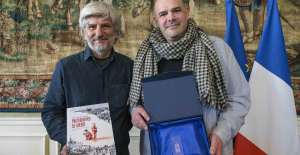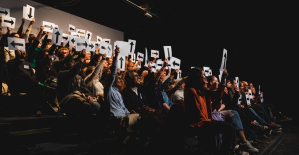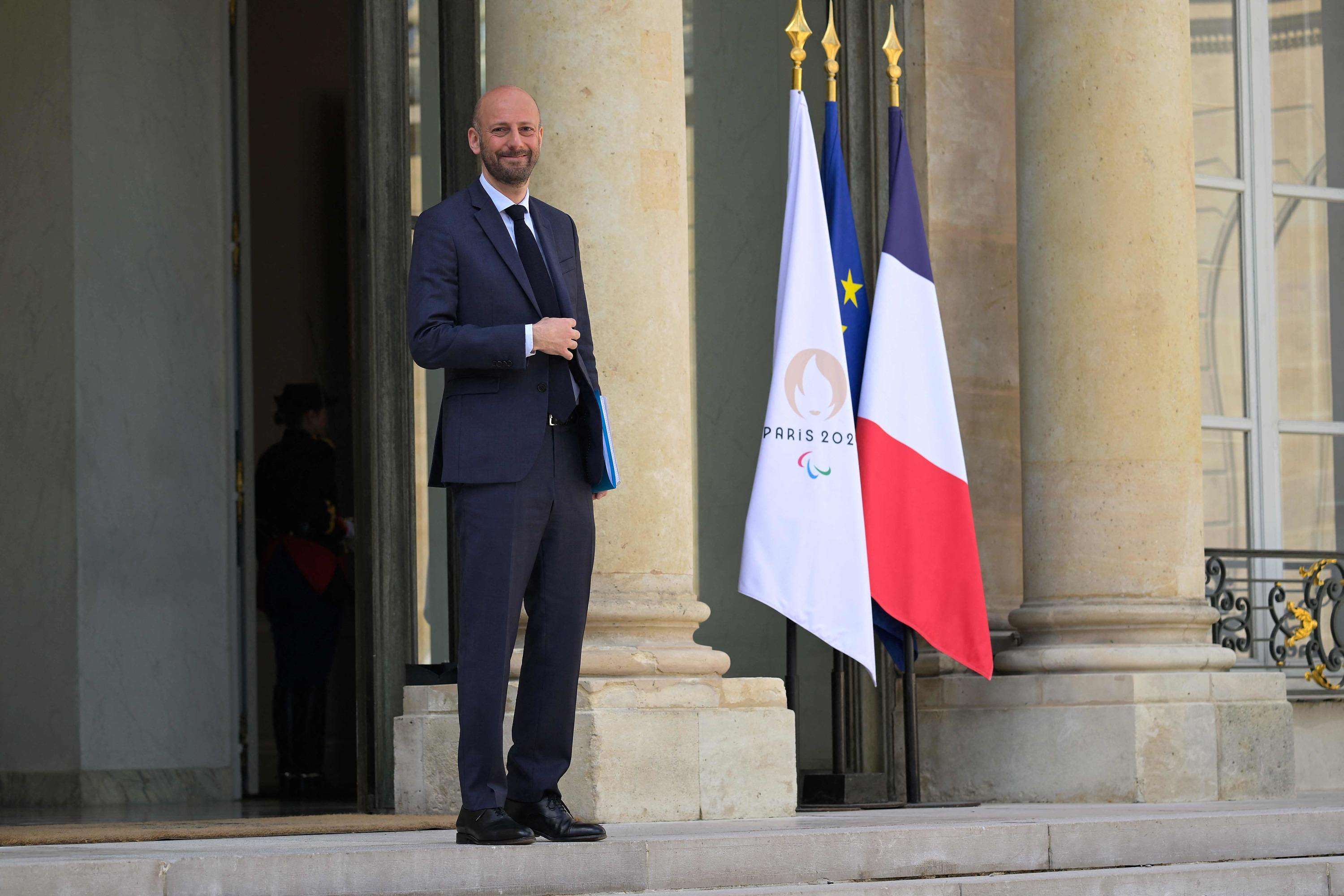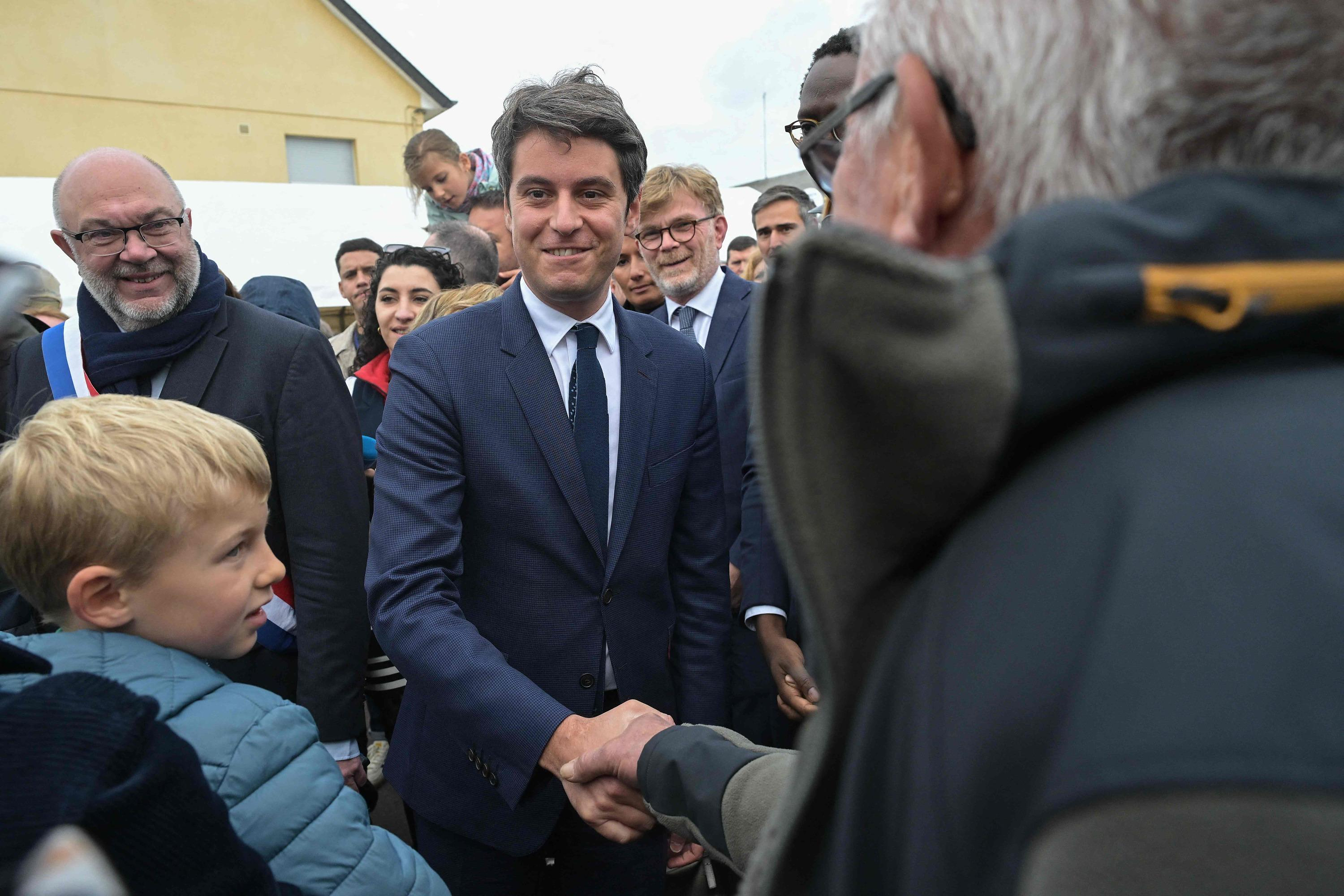Adnan Mevic would like to leave. In his head he's already that, he's already leading a life somewhere abroad. In Germany, in Austria. Actually, he says, the location doesn't matter - as long as he finally gets a real perspective there. He would like to buy a new car or a mobile phone, maybe later even build a house.
Anything is possible abroad, says Adnan and smiles while sitting in a café in a shopping center near Sarajevo. Only here in Bosnia, nothing works there. "Whoever stays here will not find happiness," he says. "Staying here is not a solution."
Adnan Mevic was once considered a beacon of hope for Bosnia-Herzegovina, the Balkan country that was to find peace after a civil war in the 1990s. When he was born on October 12, 1999 at exactly 0.02 a.m. in a hospital in Sarajevo, he was declared the sixth billionth person by the United Nations in a complicated statistical procedure.
The little boy was not only intended to symbolically draw attention to the increase in the world population, most of which, like his family, lived on the poverty line. He should also stand for the departure of his homeland into a better future. The then General Secretary Kofi Annan visited Adnan and his exhausted mother while he was still in the maternity ward. The photo went around the world and Adnan became famous.
23 years later, the baby and the little boy who WELT AM SONNTAG visited in 2011 has become a young man. There is a serious expression in his eyes. Adnan seems reserved, cautious. Maybe that's how it has to be in a country where neighbors once murdered each other and hardly anything is left of the good wishes from back then.
Not only that, according to experts, the world population will probably exceed the eight billion mark in autumn and most people like Adnan's family are still living on the poverty line. In 2022, more people than ever before will be fleeing – like Adnan, who soon wants to flee the lack of economic prospects in his homeland. In this respect, his story actually stands for that of an entire generation.
Adnan still thinks it's great that he was the six billionth person on earth, "but actually nothing special". Sure, he opened children's clinics and was invited to Spain by football stars. Yes, he also met politicians and talked about his situation.
His family remained poor, however, especially after his father died of cancer after Adnan's tenth birthday. Life in Bosnia is a constant struggle for people like him. Only the small orphan's pension of the father, who worked in a cinema, and the small earnings of his mother as a cleaner ensured her survival.
"In the end, it's up to you how you shape your future," he says. "But you can't build anything in a country where you don't know whether there will be war soon - or not. Where nothing works, nothing goes further.”
In fact, nearly 30 years after the Dayton Accords, which were meant to bring peace to Bosnia, there is an oppressive listlessness in the country. Political decisions are constantly blocked because everything has to be subordinate to ethnic parity: there are three presidents, three parliaments and the most complicated system of government in the world.
All of this paves the way for corruption (ranked 65th out of 179 countries) and nationalism, as the recent elections once again confirmed. Bosnian Serb President Milorad Dodik has repeatedly threatened to split off the Republic of Sprska. The Croatian population would also prefer to break out of the federation and join Croatia sooner rather than later, because then you would be pretty fast in the EU.
But then what about what is left: the piece of trunk where mainly the Muslim population lives? The part that Adnan's family calls home. He doesn't even want to think about it, he says. His mother has already had to experience a war, and he definitely wants to spare her another one. Another reason to get the hell out of here as soon as possible.
Once he's abroad, he definitely wants to catch up, says Adnan. He doesn't care about the nationalities at all. In his circle of friends there are Muslims, Serbs and Croats. "It's important to me what kind of person you are. But for many in Bosnia it is more important what is in the passport and to which ethnic group you belong. And that sometimes decides whether you find work or not.”
Then Adnan points to the waiters of the café. "Look," he says. "Everyone who works here studied like me - and then can't find a job. Some of them are engineers with diplomas, but they have to serve here.” Anyone who wants a good job in Bosnia, perhaps with an international company, has to pay for it secretly. "It's all nepotism," explains Adnan. “You can only be successful if your family has money or influence. But little people, people like me, don't make it to the top."
Adnan studies economics at the request of his mother. She thought he could always find something with it. He might have chosen something else himself, but it doesn't matter anyway, he says. Abroad, his degree is hardly worth anything, there he will have to start from scratch. At the moment he works part-time in construction. He does everything that comes up there: plastering, hauling stones, laying cables. "I don't need to study for that." He was also a chauffeur for the super-rich from Arab countries. "They vacation here, see how beautiful our forest is, and buy everything," he says with a bitter laugh. But they wouldn't bring permanent work with them.
Without his smaller jobs, it would be even harder for him and his mother to make ends meet, he continues. “My mother gets 350 euros a month. And life here costs just as much as in Germany. A liter of oil is equivalent to almost two euros. How are you supposed to pay for that?” He could work in Germany right away, and then the salary would at least be adjusted. Friends of his are already there and very satisfied.
Unlike in the neighboring countries of Croatia and Serbia, there is actually only little economic investment in Bosnia to get the population into work - which is mainly due to the political uncertainty. Only 40 percent of 15 to 64 year olds are employed. In 2020, economic growth collapsed by more than three percent as a result of the corona crisis, but recovered again, albeit at a low level. Three decades after the war, the country is still dependent on loans and aid programs from the EU and the IMF.
As a result, more and more people are migrating. Almost 1.7 million Bosnians now live abroad, and according to forecasts, the population is expected to fall by another 18 percent by 2050. Adnan also plans to never return once he leaves. He doesn't even want a girlfriend here, so he can leave this country with a clear conscience, he says.
One more year, says Adnan, and then he'll have made it. Then he would be done with his studies. He is planning his emigration with military precision, is learning English, and in the near future he wants to attend intensive German courses. He has also passed his truck driver's license. "You are urgently looking for truck drivers or messengers for parcel services or nurses in the hospital. We here in Bosnia know that you are missing people everywhere. In the German embassy in Sarajevo, they stamp the visas in our passports in batches.” And if it doesn't work out in Germany, then it will be another country.
Is there anything that could keep him in Bosnia after all – for example if the country joins the European Union? Adnan laughs like he's heard a bad joke. "The EU? Never! The country doesn't change overnight." It will take another 20 or 30 years before people in Bosnia-Herzegovina think like they do in the EU, maybe even longer. "I can't wait for that," he says. "I want to live. And now.”

 B:SM will break its investment record this year with 62 million euros
B:SM will break its investment record this year with 62 million euros War in Ukraine: when kyiv attacks Russia with inflatable balloons loaded with explosives
War in Ukraine: when kyiv attacks Russia with inflatable balloons loaded with explosives United States: divided on the question of presidential immunity, the Supreme Court offers respite to Trump
United States: divided on the question of presidential immunity, the Supreme Court offers respite to Trump Maurizio Molinari: “the Scurati affair, a European injury”
Maurizio Molinari: “the Scurati affair, a European injury” Irritable bowel syndrome: the effectiveness of low-carbohydrate diets is confirmed
Irritable bowel syndrome: the effectiveness of low-carbohydrate diets is confirmed Beware of the three main sources of poisoning in children
Beware of the three main sources of poisoning in children First three cases of “native” cholera confirmed in Mayotte
First three cases of “native” cholera confirmed in Mayotte Meningitis: compulsory vaccination for babies will be extended in 2025
Meningitis: compulsory vaccination for babies will be extended in 2025 In the United States, a Boeing 767 loses its emergency slide shortly after takeoff
In the United States, a Boeing 767 loses its emergency slide shortly after takeoff The A13 motorway will not reopen on May 1
The A13 motorway will not reopen on May 1 More than 1,500 items for less than 1 euro: the Dutch discounter Action opens a third store in Paris
More than 1,500 items for less than 1 euro: the Dutch discounter Action opens a third store in Paris 100 million euros in loans, water storage, Ecophyto plan… New measures from the executive towards farmers
100 million euros in loans, water storage, Ecophyto plan… New measures from the executive towards farmers Books poisoned with arsenic present in French libraries
Books poisoned with arsenic present in French libraries New York justice returns 30 works of art looted from Cambodia and Indonesia
New York justice returns 30 works of art looted from Cambodia and Indonesia Les Galons de la BD dedicates War Photographers, a virtuoso album on the Spanish War
Les Galons de la BD dedicates War Photographers, a virtuoso album on the Spanish War Theater: Kevin, or the example of an academic failure
Theater: Kevin, or the example of an academic failure Skoda Kodiaq 2024: a 'beast' plug-in hybrid SUV
Skoda Kodiaq 2024: a 'beast' plug-in hybrid SUV Tesla launches a new Model Y with 600 km of autonomy at a "more accessible price"
Tesla launches a new Model Y with 600 km of autonomy at a "more accessible price" The 10 best-selling cars in March 2024 in Spain: sales fall due to Easter
The 10 best-selling cars in March 2024 in Spain: sales fall due to Easter A private jet company buys more than 100 flying cars
A private jet company buys more than 100 flying cars This is how housing prices have changed in Spain in the last decade
This is how housing prices have changed in Spain in the last decade The home mortgage firm drops 10% in January and interest soars to 3.46%
The home mortgage firm drops 10% in January and interest soars to 3.46% The jewel of the Rocío de Nagüeles urbanization: a dream villa in Marbella
The jewel of the Rocío de Nagüeles urbanization: a dream villa in Marbella Rental prices grow by 7.3% in February: where does it go up and where does it go down?
Rental prices grow by 7.3% in February: where does it go up and where does it go down? Even on a mission for NATO, the Charles-de-Gaulle remains under French control, Lecornu responds to Mélenchon
Even on a mission for NATO, the Charles-de-Gaulle remains under French control, Lecornu responds to Mélenchon “Deadly Europe”, “economic decline”, immigration… What to remember from Emmanuel Macron’s speech at the Sorbonne
“Deadly Europe”, “economic decline”, immigration… What to remember from Emmanuel Macron’s speech at the Sorbonne Sale of Biogaran: The Republicans write to Emmanuel Macron
Sale of Biogaran: The Republicans write to Emmanuel Macron Europeans: “All those who claim that we don’t need Europe are liars”, criticizes Bayrou
Europeans: “All those who claim that we don’t need Europe are liars”, criticizes Bayrou These French cities that will boycott the World Cup in Qatar
These French cities that will boycott the World Cup in Qatar PSG: “Immense pride in continuing the adventure in Paris”, relishes Zaire-Emery
PSG: “Immense pride in continuing the adventure in Paris”, relishes Zaire-Emery Breaking: everything you need to know about this sport
Breaking: everything you need to know about this sport NBA: Lakers gain respite, Boston responds to Miami
NBA: Lakers gain respite, Boston responds to Miami Top 14: “a very severe red card”, estimates Labit (French Stadium)
Top 14: “a very severe red card”, estimates Labit (French Stadium)

















